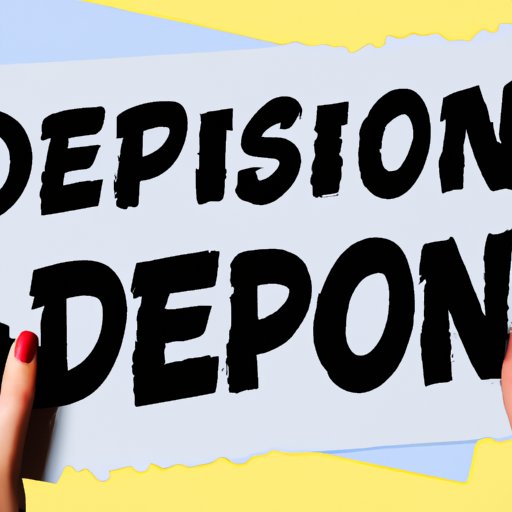
Introduction
Depression is a common mental illness that affects millions of people worldwide. It is more than feeling sad or having a bad day. Depression is a persistent feeling of sadness, hopelessness, and despair that can be life-changing for those who experience it.
Identifying depression is crucial as early recognition of symptoms can lead to timely intervention. This article explores how to recognize the signs of depression and the role of self-awareness in identifying the symptoms.
Symptoms
Depression symptoms vary in intensity, duration, and frequency. Symptoms of depression can be emotional, cognitive, and physical.
Emotional symptoms include feelings of sadness, hopelessness, irritability, and emptiness.
Cognitive symptoms are changes in thinking patterns, including feelings of worthlessness, guilt, and self-blame. Depression can make it challenging to concentrate, make decisions, and remember things.
Physical symptoms include fatigue, changes in appetite, sleep disturbances, and chronic pain.
Cognitive changes
Cognitive changes can be defined as negative thinking patterns associated with depression. Depression can lead to feelings of hopelessness and pessimism, even when good things happen. This negativity can make it challenging to find joy in everyday activities, leading to feelings of isolation and loneliness.
Depression can also impact concentration and memory, making it difficult to stay focused and remember things.
Interpersonal relationships
Depression can have a significant impact on interpersonal relationships affecting the dynamics of family, friends, and romantic relationships.
Depression can result in irritability, minimizing the enjoyment of social activities, and negatively affecting the quality of communication with others. Moreover, the inability to express emotions correctly can lead to conflicts and misunderstandings, often resulting in ruined relationships.
Physical symptoms
Physical symptoms of depression can be linked to emotional symptoms where one tends to experience physical changes as a response to emotional distress. For example, individuals experiencing depression may feel fatigued and lethargic, have consistent headaches, and body pains, and even digestive issues.
Changes in Behaviors
Depression can lead to significant changes in behavior. For instance, it can cause individuals to lose interest in hobbies and activities they once enjoyed, withdraw from friends and family, and have difficulties at work or school.
In general, depression can make it difficult for individuals to complete tasks or follow-through with commitments, making them appear unreliable and unconfident.
Self-awareness
Self-awareness plays a crucial role in identifying the signs and symptoms of depression. It’s vital to know your usual moods, thoughts, and behaviors to recognize a shift in your mental health.
Becoming self-aware involves consistently checking in with yourself and taking stock of your emotions and mental state. This can help you learn to recognize patterns and identify potential triggers.
Conclusion
Depression can be a debilitating mental health challenge, but it is treatable. Early intervention, such as talk therapy, medication, and changes to lifestyle, can make all the difference in the healing process.
If you suspect that you or someone you know is experiencing depression, it’s important to seek professional help. Identifying depression early on and initiating treatment leads to a successful treatment outcome.





